| Srl | Item |
| 1 |
ID:
093238
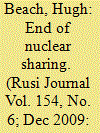

|
|
|
|
|
| Publication |
2009.
|
| Summary/Abstract |
US nuclear weapons are still based on the soil of non-nuclear European allies. The doctrine of first use, as a last resort in the face of military aggression, also remains. However, change is in the air: nuclear weapons seem increasingly irrelevant in modern war, and the new US administration advocates a nuclear-free world. Hugh Beach argues that a new policy on forward-based nuclear weapons may be required, but that it will have to come from Europe and be able to match the credibility and solidarity afforded by current nuclear sharing.
|
|
|
|
|
|
|
|
|
|
|
|
|
|
|
|
| 2 |
ID:
086631
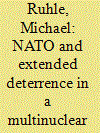

|
|
|
|
|
| Publication |
2009.
|
| Summary/Abstract |
Concerns about nuclear proliferation have led to a new wave of enthusiasm for far-reaching nuclear disarmament schemes. According to their proponents, the United States must take the lead in generating a new global disarmament dynamic, including withdrawing the remaining U.S. tactical nuclear weapons from Europe. Such a step will not spell the end of extended deterrence, yet its drawbacks would far outweigh its gains. While achieving little in terms of relaunching disarmament, it would weaken nuclear sharing as an important achievement of managing alliance security. In an emerging multinuclear strategic environment, maintaining a visible nuclear bond between the United States and its NATO allies is not a Cold War relic, but a sensible and nonprovocative means of both deterrence and nonproliferation.
|
|
|
|
|
|
|
|
|
|
|
|
|
|
|
|
| 3 |
ID:
152068
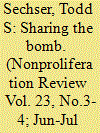

|
|
|
|
|
| Summary/Abstract |
What are the political and strategic consequences of nuclear deployments overseas? The United States continues to maintain around 200 nuclear warheads in Europe, and some observers have called for the United States to redeploy tactical nuclear weapons to the Korean peninsula. This article reviews the insights from recent research on the effects of foreign-deployed nuclear weapons. It asks two central questions. First, does the evidence support the view that foreign nuclear deployments contribute to deterrence? Second, do these deployments strengthen or undermine the Treaty on the Non-Proliferation of Nuclear Weapons? The evidence suggests that foreign nuclear deployments contribute less to deterrence than previously believed. Further, nuclear deployments probably have mixed effects on proliferation. Unanswered questions for further research include the extent to which nuclear-sharing arrangements reassure allies, and the political and strategic consequences of canceling them.
|
|
|
|
|
|
|
|
|
|
|
|
|
|
|
|
| 4 |
ID:
144290
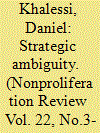

|
|
|
|
|
| Summary/Abstract |
Since the 1950s, the United States has engaged in nuclear sharing with its NATO allies. Today, 150-200 tactical nuclear weapons remain on European soil. However, the Treaty on the Non-proliferation of Nuclear Weapons (NPT) prohibits the transfer of nuclear weapons to non-nuclear weapon states. The potential discrepancy between text and practice raises the question of how the NPT's negotiators dealt with NATO's nuclear-sharing arrangements while drafting the treaty that would eventually become the bedrock of the international nonproliferation regime. Using a multitiered analysis of secret negotiations within the White House National Security Council, NATO, and US-Soviet bilateral meetings, this article finds that NATO's nuclear-sharing arrangements strengthened the NPT in the short term by lowering West German incentives to build the bomb. However, this article also finds that decision makers and negotiators in the Lyndon B. Johnson administration had a coordinated strategy of deliberately inserting ambiguous language into drafts of Articles I and II of the Treaty to protect and preserve NATO's pre-existing nuclear-sharing arrangements in Europe. This diplomatic approach by the Johnson administration offers lessons for challenges concerning NATO and relations with Russia today.
|
|
|
|
|
|
|
|
|
|
|
|
|
|
|
|
| 5 |
ID:
192145
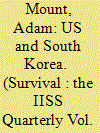

|
|
|
|
|
| Summary/Abstract |
As US officials have grown more anxious about the credibility of extended nuclear deterrence, they have placed renewed emphasis on nuclear-assurance measures. The hope is that closer exercises and consultations can reassure allies, strengthen deterrence postures and reduce the risk that an ally could pursue their own nuclear weapons. However, recent developments in the US–South Korea alliance suggest that nuclear assurance is not only ineffective at reassuring Seoul but may also be fuelling proliferation risks. By raising the salience of nuclear weapons within the alliance, nuclear assurance reinforces the fiction that South Korea’s defence depends on nuclear use. Misunderstanding the risks and potential of nuclear assurance has fuelled calls for a South Korean nuclear-weapons programme and obstructed the alliance’s ability to adapt and improve its deterrence posture.
|
|
|
|
|
|
|
|
|
|
|
|
|
|
|
|